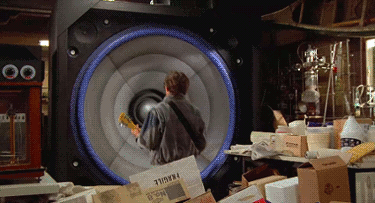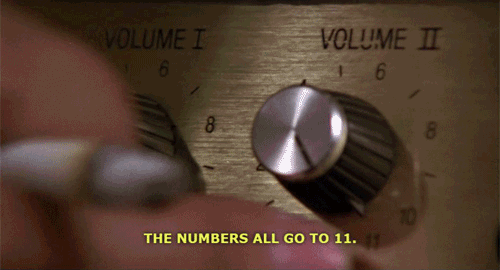
If I was starting out again playing live music as a 16-year-old naive spotty teenager, what advice would I give myself?
Wear protection.......In-Ear protection that is!
It's the number one piece of advice I'd give any young musician starting out today.
Why? You may ask. But I won’t hear you, because I’m partially deaf after years of abusing my ears playing with a live band.
Constant exposure to loud music will cause irreversible and unrepairable damage to your hearing. As a musician your ears should be one of your most cherished and prized assets. Statistically guitar players are the deafest of all musicians. I think!
Music itself is not the culprit when it comes to damaging your hearing but rather the loudness and duration of the music you are exposed to. Now don’t get me wrong, I love loud music, but I’ve never left a concert without ringing in my ears, and that is not good.
So listen up all you budding musicians, and I’m not just referring to the wannabe rockers, but to ALL musicians and DJ’s too. Here are six things I wish I'd known about hearing and in-ear monitors before I started using I them.

1. Be Informed
What instrument do you play? The triangle? That’s cute! It’s not very loud so you can sit down loser! Bad example. The triangle actually has one of the most damaging frequencies - anything over 2-400Hz runs the risk of causing problems. The triangle is positioned at the back off the orchestra with the rest of the Timpani and brass instruments due to how loud it is. You will always here that ting! (Pun intended). Know how frequency of the instrument you play.
Here’s a great example of instruments and where they sit in the audible frequency spectrum.

2. Position yourself
Have you ever played a show and witnessed some idiot standing directly in front of the speaker system shouting down their phone? “I can’t hear you?” Of course you can’t, you’re being blasted with 10,000 watts of a four-piece rock band doing a Rage Against the Machine cover!
Don’t stand directly in front of speakers. Best place for live sound is to get as close to wherever the sound engineer is at the front of house. If anyone is going to hear the gig it’s that guy, unless the band have pissed him off during sound check and he’s sabotaging their show. It happens. (SUB-lesson –always be nice to the sound guy!)
3. Shut up!
Take a break. Even Bruce lets the E-street band sit out a few songs to let his ears have a break. You do the same - if you can take a break during your show, then do so. The same applies in rehearsals and when practicing at home.
4. Take a hint
If one of your bandmates or fellow musicians is struggling to hear themselves over your instrument, then adjust your volume to accommodate them. Guitar players love playing loud, it’s what they do. As a singer though, my vocals are within the same frequency range as the guitar so more often than not I will struggle to hear myself. If your guitar player just doesn’t listen, then fire his ass. Playing in a band is a team effort. Hogging the proverbial sonic limelight doesn't do anyone any favours. Respect your bandmates.
5. Clean your ears
Simple.

6. Wear in ear monitors
All the above has been leading to this.
A few years ago I developed nodules and lost my voice. I was devastated. I’d sang for a living since I was 18. Now that was all gone. The doctors shoved cameras down my throat and prescribed me a strong dosage of “shut the fuck up.”
Luckily there were other singers in my band at the time and we made it through all our bookings. After about a year my nodules had subsided, but not before they took away my beloved falsetto which never fully recovered. So I gave up singing “I feel love” by Donna Summer and replaced it with some Johnny Cash and bought myself some in-ear monitors.
I started out with the cheap headphones that came as standard with my transmitter pack and soon learned that investing in in-ear monitors is all about the headphones.
THAT’S WHERE YOU GOTTA SPEND SOME MONEY.

Wearing in-ears is not without its drawbacks, but the advantages far outweigh these.
Start using in-ears at rehearsals first to get your mix right. I like to hear a mix of the whole band, with a little more bass guitar as the bass keeps me in tune, some kick and snare drum to keep me in tempo and my vocals and acoustic guitar sitting on top.
Be prepared to feel isolated though. Once the in-ears go in, they need to stay in for the duration of your show. Pulling one or both out mid show can cause damage due to the sudden increase in volume from everything around you, the very thing you're trying to avoid! You’ve now isolated the music from the venue and the crowd but It’s not unusual for artists to have a mix of auditorium ambient mics fed to their in-ear mix so as to capture the atmosphere of the crowd and the room.
I enjoy the isolation and have mastered the art of lip reading my band mates! Plus, I no longer have to listen to silly requests from drunken wedding guests or hen parties in clubs. Don’t worry if we haven’t played Proud Mary yet - we will!!
When you have a clear mix in your ears and can hear your instrument clearly you no longer have to compete with the noise of amps and drums onstage. Hearing my vocals clearly protects me from over-singing and straining or damaging my voice.
It may be obvious but don’t have your in-ears too loud either. A limiter is advisable to avoid any sudden insurgence of a guitar amp being cranked to 11 during a Gun’s n Roses cover! Most transmission receiver sets have a limiter as standard.
The same applies for DJ’s and studio engineers. I tend to mix at low volume in the studio. If something sounds good at 30 decibels, then it’ll sound awesome being blasted out at full volume to a packed nightclub!
Keep your in-ears clean too. Ear gunge can build up inside them very quickly. Yuck!
Now, whether you play in your local pub to 15 people or in a stadium to 40,000, whatever the venue, your monitor requirements and what you hear on stage will remain the same.
So, if you play in an orchestra or a band, sing on stage, or DJ at friends’ parties—or want to when you get older—remember to protect your hearing.
Look after your ears and they will look after you.
Now shush!
Need some further info? Check out these links about choosing the right in-ear monitors for you:
